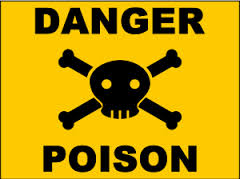Commercial pesticides are the most common cause of dog poisonings. Fly baits containing methomyl such at Stimukil and slug baits are particularly dangerous. Methomyl is rapidly absorbed into the skin, lungs, and gastrointestinal tract and is broken down in the liver. Vomiting, seizures and death are the most common signs of ingestion. Mole and gopher baits and rat poisons are also dangerous to dogs. Avoid using any of these in areas where accessible to your dog and keep packages of pesticides safely locked away.
Human medications are second to pesticides in causing animal poisoning. They can be lethal to dogs and should be kept out of reach. Even common pain relievers can be dangerous to dogs. One regular strength 200 milligram ibuprofen can cause stomach ulcers in a 10 pound dog; ingestion of two or more can cause seizures and coma. The most commonly reported medications involved in animal poisonings are non-steroidal anti-inflammatory painkillers such as ibuprofen, antidepressants, cold and flu medicines and diet pills.

Seasonal products can also contain toxins hazardous to your dog. Christmas tree water contains fertilizers that can upset the stomach. Stagnant tree water also can breed bacteria, leading to vomiting, nausea, and diarrhea if ingested. Other dog toxins include household cleaners, rubbing alcohol, ice-melting products, batteries, paint, boric acid, hair coloring, and other human grooming products such as shampoo and petroleum products. The best prevention is to keep these items out of your dogs reach.




